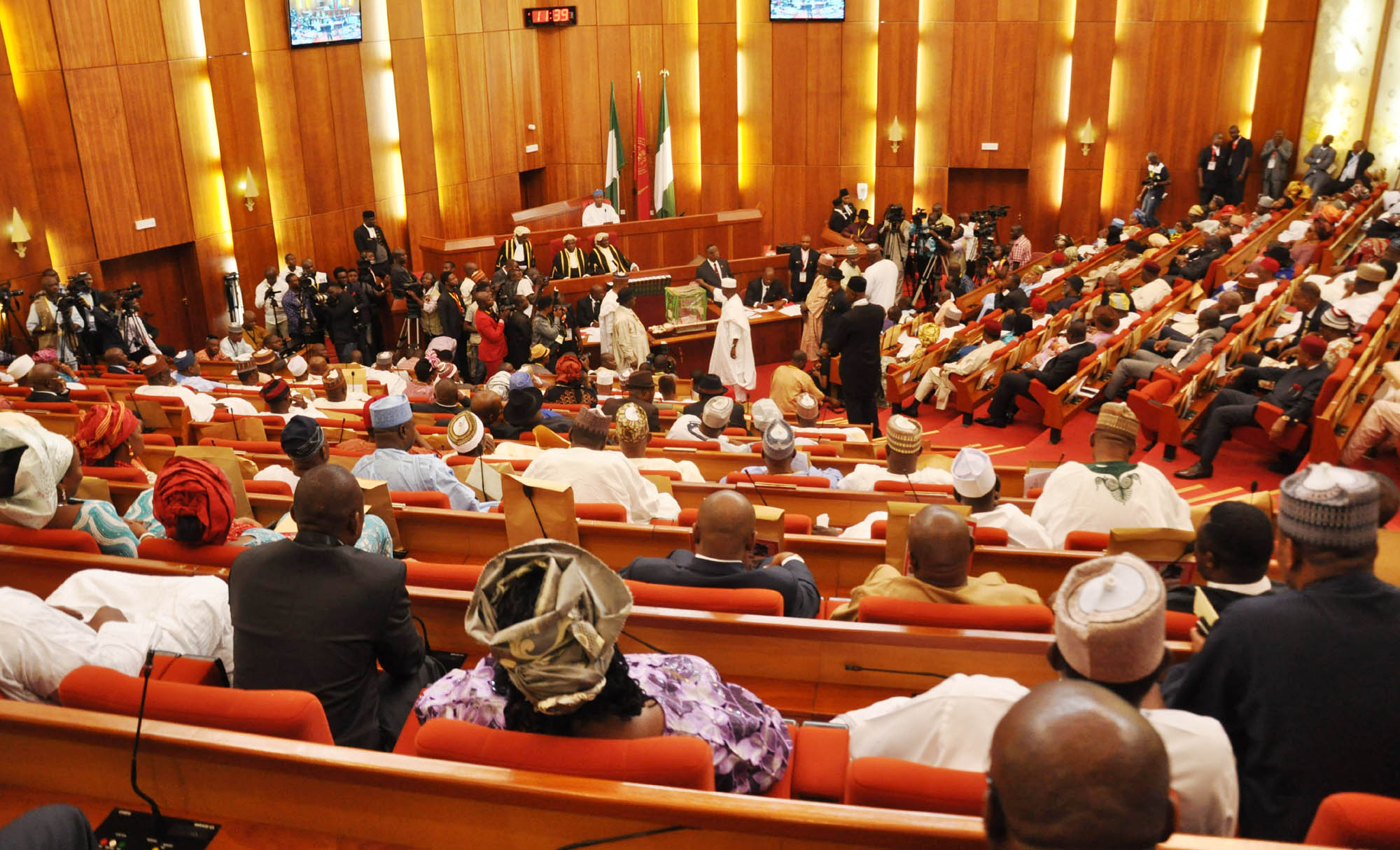Police, Senate And Budget Palaver
Unfolding events between the Nigeria Police Force and the Senate casts doubt over the timely passage of the 2017 budget. But there are implications for an economy in recession, writes EMAMEH GABRIEL
Few days to the expiration of the 2016 budget, the rising hope following the early passage of the 2017 appropriation bill presented to the National Assembly appears uncertain, as unfolding events portend.
When President Muhammadu Buhari presented the 2017 Appropriation Bill to a joint section of the National Assembly in November last year, Nigerians heaved a sigh of relief that the presentation was timely and would help speed-up activities in the next fiscal year.
Many had hoped that, by now, the bill would have been passed into law, contrary to what transpired during the passage of the 2016 budget that was marred by several controversies.
The 2016 budget was not only described as the most controversial, but also one of the slowest to be passed in the history of budget-passing in the country.

It was one drama too many; from a ‘missing’ budget document to the ‘padded’ budget, the controversies that trailed the apex financial document in the country led to the suspension of Hon. Abdulmiminu Jibril, who fought the entire National Assembly till he was forced out by powerful forces from both chambers.
Allegations of collaborations between key members of the Federal Legislature and ministries, department and agencies (MDAs) to enrich themselves through the budget and the refusal of the leadership of the chamber to make public its annual budget further dampened the image of the lawmakers and caused the rising hope to wane.
Nevertheless, the budget was finally passed, amidst a perception crisis against the lawmakers.
At the presentation of the 2017 budget in November, Buhari christened the bill “Budget of Recovery and Growth,” saying that it was higher than the N6.07trillion 2016 Appropriation Bill by about 19.95 per cent.
Speaker of the House of Representatives, Yakubu Dogara, had, in his address, called for the extension of the 2016 budget, particularly the capital component, until May 2017, 12 months from when the current budget was signed into law.
Dogara said this was necessary, because whilst the recurrent component of the budget was usually implemented to an appreciable level, the implementation of the capital component remained very low.
“It is crystal clear that the capital component of the 2016 budget cannot realistically be implemented for only six months considering the time required for procurement process and the raising of revenue including loans by government,” he said but assured Nigerians of the National Assembly’s commitment to pass the budget timely.
Sadly, Nigerians are witnessing, yet again, another rowdy session that may stall the passage of the 2017 Budget, as the Senate has accused the Nigerian Police Force of truncating the process.
While news that the Police raided the Abuja residence of the chairman of the Senate Committee on Appropriation, Danjuma Goje (APC,Gombe) went viral, little did analysts suspect that it would become an issue that would affect the budget.
Following tips from a whistle-blower, the police had, on April 20, searched the senator’s residence for incriminating evidence.
Goje was believed to be in his office at the National Assembly working on the 2017 budget proposal when he was called that the team of policemen who had stormed his house.
However, to the consternation of many watchers, Goje, at the resumption of plenary on Wednesday last week, raised a point of order (PoO) where he accused the police outright of carting away files (18, he said), documents and laptops relating to this year’s budget from his home during the raid.
According to Goje, the budget would have been presented on Tuesday, passed Wednesday and, subsequently, presented to President Muhammadu Buhari on Thursday, but was no longer feasible, following the actions of the police.
“We were holding a meeting on the budget on Thursday (when his house was raided). So, from Thursday (last week) till now, we have not been able to meet because some of the papers are not around. Many of us are traumatised. As a politician, my house is a bee-hive of activities; people come from all over the country to sympathise with me. I have no time to sit.
“From today, we would try to start sitting again to see what we can do with the budget. I want to apologise to my colleagues that we could not keep to the time-table you gave us to lay the budget yesterday (Tuesday) and to get it passed today (Wednesday). I think it is not our own fault; it is the fault of the police, because they interfered with the budget process and I hope Nigerians will not turn out to blackmail the National Assembly, because the process was truncated by the police.”
Following his revelations, the Senate President Bukola Saraki set up a seven-man committee led by Barau Jibrin (APC, Kano North) to investigate the matter and report back to the house. Also, the leadership of the Senate gave the police 24 hours to return the alleged stolen budget.
The police denied having anything to do with the 2017 budget as alleged by Goje, describing the allegation as a “malicious charade meant not only to draw public sympathy but to divert public attention away from him to avoid being questioned on grounds of the incriminating evidences” found in his house.
In a statement released and signed by the Police spokesperson, CSP Jimoh O. Moshood, the police said it was executing its constitutional duties in line with sections 4 and 28 of Police Act and Regulations.
‘‘The report in its entirety is false, misleading and capable of misinforming Nigerians about the statutory roles and duties of the Nigeria Police Force.
“A court warrant was approved by a competent court before the operation was carried out following intelligence report that ‘large sums of money suspected to be stolen public funds and other incriminating items were about to be moved out’ of Goje’s house,” the statement said in part.
The police further stated that, contrary to insinuations made by Goje, among the items recovered from Goje’s house, none had anything to do with the 2017 budget.
‘‘The procedure of law on search warrant which contained the money, documents and laptop recovered. None of the items included the 2017 budget document. This is available for inspection by any interested member of the public,’’ the statement read.
In further clarification, the police listed three witnesses present at the scene of the operation, who happened to be Goje’s aides or relatives, saying all documents/items recovered were duly signed by these persons.
The police said cash of different currencies and denominations were recovered alongside incriminating evidences.
‘‘The Nigeria Police Force wishes to state categorically that there was no single document relating to 2017 budget sighted or removed by the Police team that executed the search warrant. There is video recording of the execution of the search warrant.”
The Inspector General of Police (IGP) honoured the invitation of the National Assembly on April 26, 2017 to explain the legality of the search warrant that was executed in Goje’s house on April 20 2017.
The police, who advised members of the public to disregard the allegations and reports cooked by Senator Goje, said the former governor had questions to answer based on criminal intentions, saying investigations were on-going.
While many have questioned the strength of the lawmaker’s claim, they argue that if he had claimed he was in his office with his colleagues working on the 2017 budget, how then was it in his house at the same time.
Also, there are questions about Goje taking an official document like that concerning the 2017 budget to his private quarters.
The same Senate had raised such questions during the screening of the acting chairman of the Economic and Financial Crimes Commission (EFCC) Ibrahim Magu, where he was rebuked over the discovery of official documents in his home.
But there are more concerns for the polity as the Senate (and, by extension, the National Assembly) appears to be spinning a drama over the passage of the budget.
The 2017 budget has been described by the Executive arm of government as “strategic to pulling the country out of recession.” This implies that Nigeria’s Economic Growth and Recovery Plan, which has several critical implementation components, contained in the 2017 budget would be delayed. The National Collateral Registry Bill and the Credit Bureau Services Bill which the National Assembly had promised would be passed by the end of April to ease assess to credit would also be affected. It is part of a 60-day ease of doing business initiative of the Federal Government.
The Federal Government has also expressed concern that delays in the passage of the 2017 Appropriation Bill by the National Assembly may stall the implementation of its Economic Recovery Growth Plan (ERGP), even as it attempts to tie exiting country recession by end of the year to early passage of the budget as well as the full implementation of the ERGP.
Minister of Budget and National Planning, Udoma Udo Udoma, said: “The 2017 budget is structured to get the economy out of the recession before the end of this year. So that is why we are anxious to get the budget passed so that we can begin the implementation and begin to take all the steps we need to get the economy out of recession.”
Delayed passage of the budget means that businesses waiting on the 2017 budget would now have to wait much longer.
Other casualties from the delayed passage of the budget include the 11 economic reform bills – the Petroleum Industry Governance Bill, National Development Bank of Nigeria Bill, National Road Fund Act (Amendment) bill, Federal Roads Authority Act (Amendment) bill and National Transport Commission (Establishment) Bill, Nigerian Ports and Harbours Authority Act (Amendment) Bill, National Transport Commission Act 2001 (Amendment) Bill, Warehouse Receipts Act (Amendment) Bill, Companies and Allied Matters Act (CAMA) (Amendment) Bill, Investment and Securities Act (ISA), Customs and Excise Management Act; Federal Competition Bill – which Senate President Bukola Saraki had promised would be passed alongside the 2017 budget.
According to experts, the 11 priority economic reform bills, if passed into law, would help create 7.5million jobs and reduce poverty by 16.4 per cent.
A public commentator and political analyst, Reston Tedekhe, who spoke with LEADERSHIP Weekend said: ‘‘The 2017 budget being taken is a narrative being sold by Goje and the Senate continuing delaying the budget, because padding and insertion elements are scared.
‘‘The economy is getting back and PMB is fighting to nationalise the economy and this budget is a major component of that process. By playing politics with the budget, the National Assembly has shown that they are anti-people, anti-good, mindless and insensitive to the suffering in the land that most of them created.”
Now that the Police has returned the documents and items it took from the lawmaker’s residence, the time lost in processing the budget won’t be recovered.
Although investigations are still on-going, Nigerians would have to wait for this phase of the drama to play out, before the budget can be revisited.
Analysts, however, wonder that, if something as important as the national budget can give birth to such awkward drama, what would become of its implementation and oversight, which are regarded as critical to salvaging an economy in recess.








